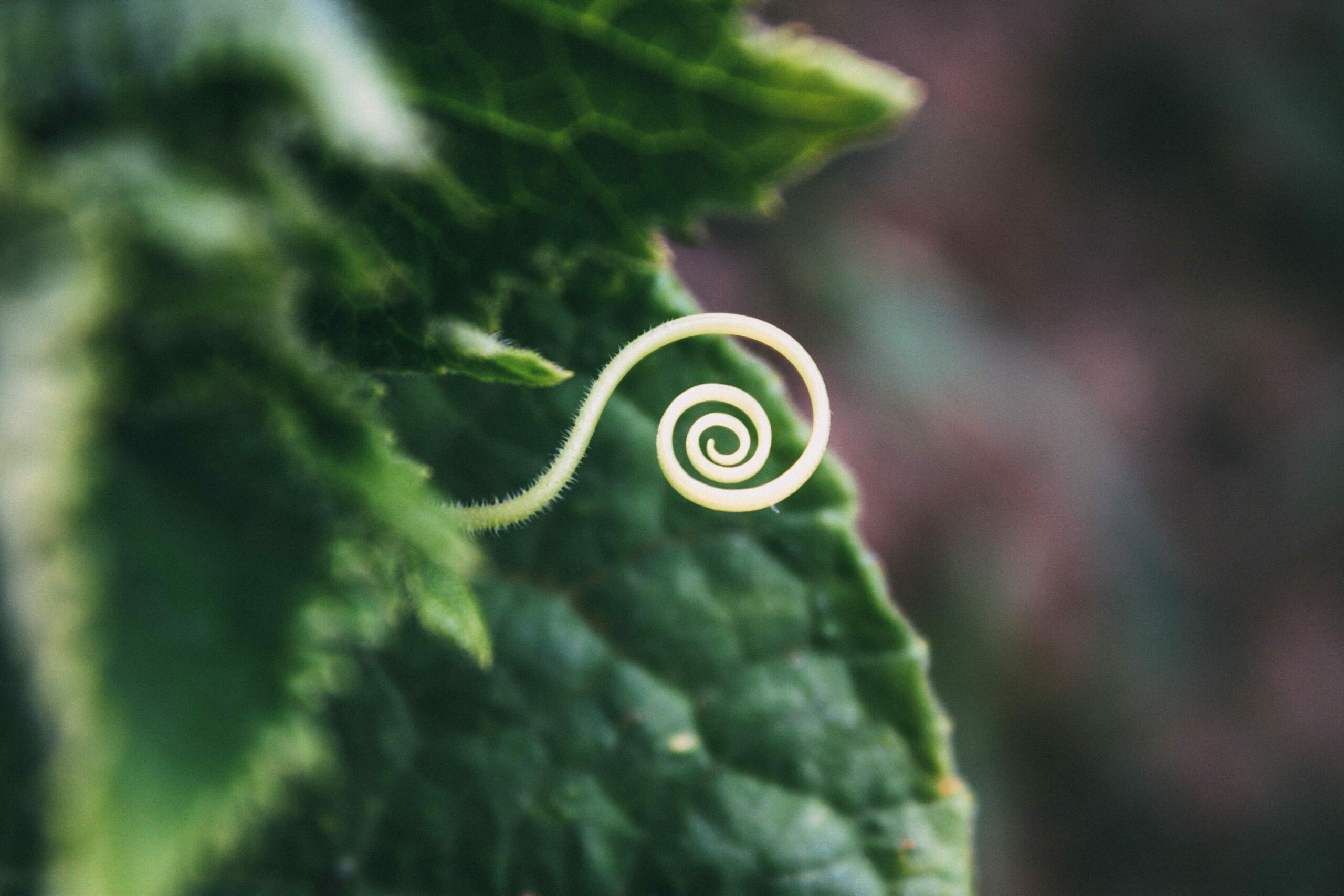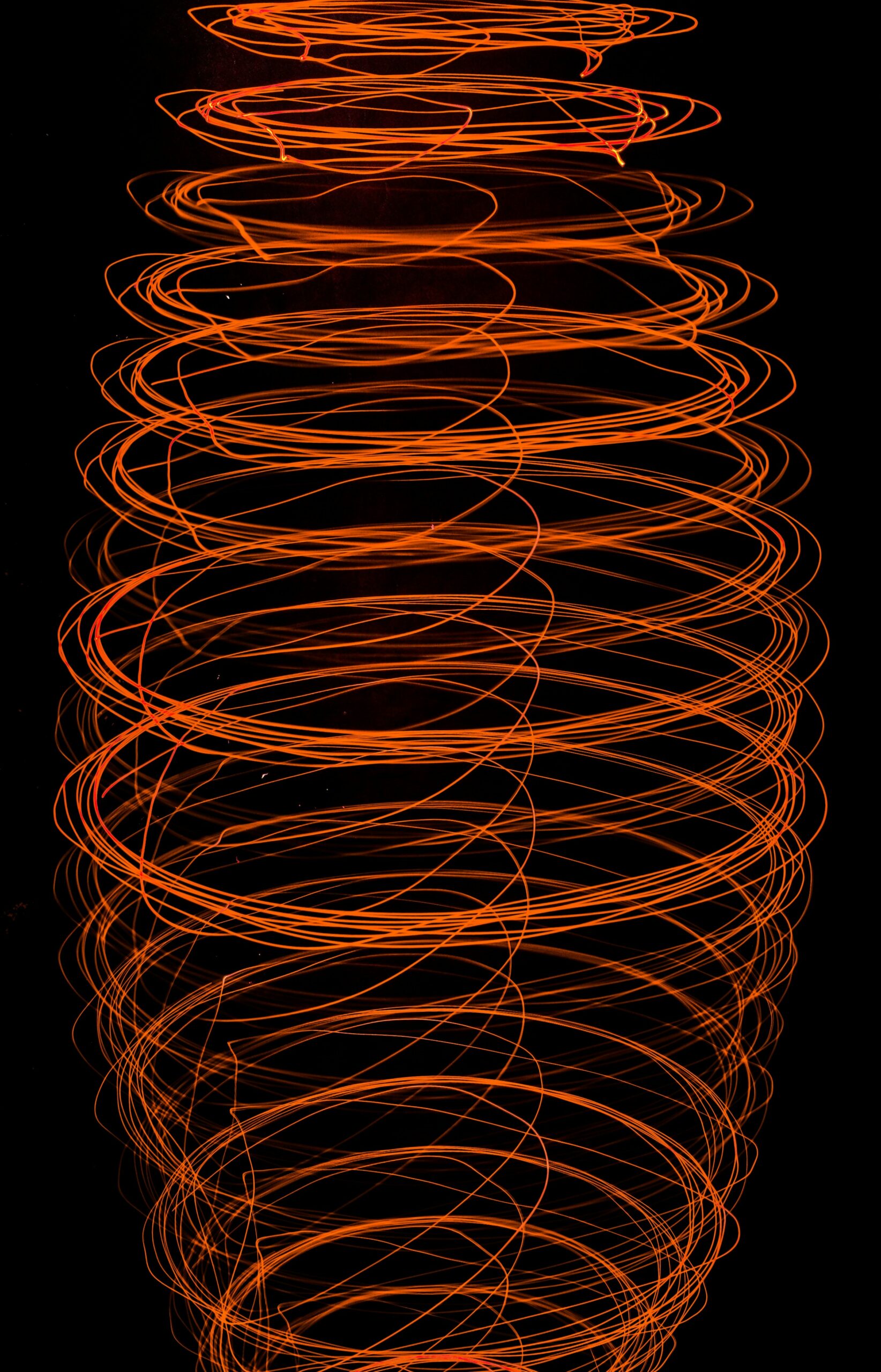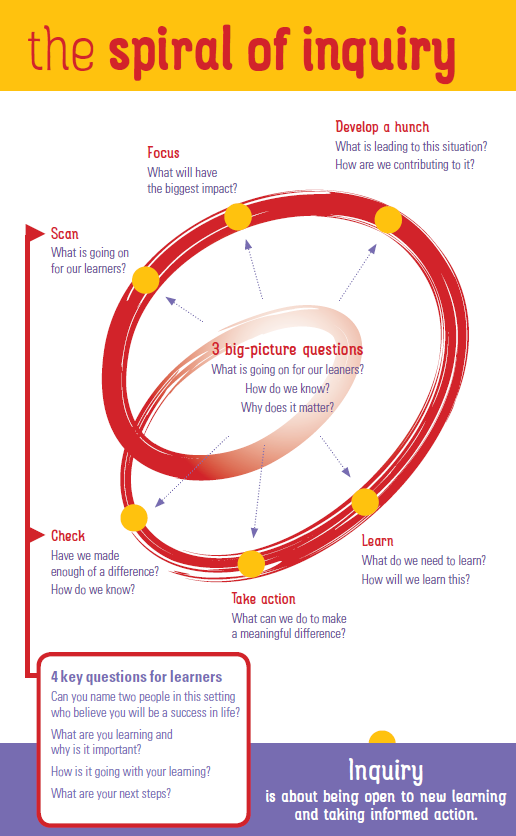
SCAN
What is going on for the learners?
What I’ve largely noticed within classrooms, even in post-secondary settings, is that few students want to or know how to be active agents in planning, meaning making, and change.
FOCUS
What do I want to investigate further: that I think will have the biggest impact?
What I want to explore then, is what is leading to this disengagement, and what I can do to get students reengaged, in an authentic way that will serve them as adults, when no one will be there to hold their hands, push them, or drag them through something they won’t hold themselves to, push themselves to do, or drag themselves through!
HUNCH
What is leading to this situation, and how am I contributing to it?
I know that the education system has even shaped me into disengaging, and being a passive agent in learning–making me weary of trying new things. I can think of two reasons for this. Firstly, failure is a very intimidating prospect because of the social consequences of failure according to traditional societal values. Secondly, pathways for starting learning outside the narrow, traditional framework are unfamiliar and even entirely unknown, making the hardest part–starting–seem entirely elusive. So, I can relate to how my students are feeling when the opportunity to learn and act presents itself, and they choose the safety of inaction or disassociation over the vulnerable act of braving something unfamiliar or performative. Thus, what I think needs to change is how we determine learning, what it looks like, how it happens, how we can check, etc.
LEARN
What do I need to learn, and how am I going to learn this?
My question for my spiral has morphed quite a bit over the last two terms, but as I’ve been scanning, focusing, and learning, I think I’ve landed on “How do I implement student-led learning and better assessment practices in my classroom, to foster bravery in learning for my students?”
Many teachers brought me to this idea, least of all my professor for e-Portfolio! However, five other notable teachers include: Alfie Kohn, Dylan Wiliams, Paul Solarz, Sir ken Robinson and Dan Finkle.
Here is a brief synopsis of an important point, or two, that I learned from each of them as I inquired and spiralled!
Alfie Kohn: Learning isn’t measurable or happening in the product or performance, but visibly occurring in the practice, so valuing grades over student practice devalues student progress, and consequently devalues student learning.
Dylan Wiliams: Assessment doesn’t mean anything unless we are properly collecting evidence, and then it only means something if we use it properly, and then it only matters if it is used to get better at something you care about getting better at.
Paul Solarz: The community of learners needs to see themselves that way, and for that to happen, they need to be made responsible, and aware of their responsibility, for their own and each other’s learning.
Sir Ken Robinson: Learning naturally happens in particular environments, and it’s the teacher’s job to cultivate those environments for their students, who are natural learners who just need the right conditions to learn, not the right teaching.
Dan Finkle: Learning can’t happen unless their is some struggle or challenge, and the teacher does not need to be the idea or the answer repository for learning: students also need to learn to teach and help themselves and each other.
So, a general statement about what they left me with is: better assessment practices and student-led learning, in a community of growth mindset practitioners, in a supportive, challenging, and explorative learning environment, will best help students be brave and engaged in their learning.
TAKE ACTION
What can I do to make a meaningful difference?
So, making the above take-away statement the reality of my classroom, appears to be the best pathway to access and foster fearless learners and doers. What I can do to make a meaningful difference for my students, then, is to (to the best of my ability):
- Implement effective and quality assessment practices
- Provide significant opportunities for student led-learning wherever possible
- Build a community of growth mindset practitioners, and
- Foster a supportive, challenging, and explorative learning environment
As yet, I have not provided assessment, but I have planned out what assessment would look like for the lessons I’ve taught in practicum so far, and used them to formatively determine how students did. This was incredibly useful for me in determining whether the lesson afforded learning for the students.
I have requested and received student feedback, and this was useful for adjusting my practice to student needs. This student feedback also lets students know that their experiences matter, and by shaping my teaching according to their learning, I let them know that I want them to lead their learning. My judgment as the teacher is to best guide them, not to tell them which path to take.
I have also provided direct opportunities for student-led learning, and have already noticed greater student engagement. Providing students with choice, accountability, and responsibility is one of the ways I have been doing this in the classroom. Additionally, I have been engaging students in group work, and group discussions, front-loading them about how I expect them to work as a team, because they are a team. Explaining how I expect them to help each other, modelling that behaviour myself, and acknowledging its benefits to the class are some of the other ways I am building community and a growth mindset amongst my students.
Whenever the opportunity organically presents itself, I also remind students about the importance of practice in achieving, and ask them to take note of their improvements. In combination with choice, teamwork, and an emphasis on practice and improvement, I am slowly but surely building a supportive, challenging, and explorative learning environment.
Last but not least, listening to my students, providing them with time to be heard by myself and their peers, and validating their experiences and ideas is a way that I am accomplishing all the actions I have set out to take. Of course, I am only learning to do all these things myself, and I need practice, and feedback too!
CHECK
Have I made enough of a difference? How do I know?
So far, I feel that I am making a difference because of the relationships I am building with my students, and because of small but telling differences in their attitudes surrounding topics I have discussed with them relating to community, growth mindsets, and more. Additionally, I was blessed with a lovely coaching teacher in my first practicum, who was aware of my goals, and provided constructive and critical feedback on whether I was making progress in them–a resounding yes. Lastly, but most importantly, student feedback informs me. This happens indirectly when I observe student behaviour and engagement, but can also happen directly when I ask them how they found an activity, what they liked, what they didn’t, what they found difficult or fun, and more. These are some questions I seriously value asking my students.
Currently, asking whether the difference I made is enough is honestly not the right question, since I would say that I didn’t spend enough time with them to make that kind of difference. However, I see signs of the possibility of big differences being made if I continue to down this pedagogy with continued practice of the spiral of inquiry.


References
Kaser, Linda, and Judy Halbert. The Spiral Playbook: Leading with an Inquiring Mindset in School Systems and Schools. 2017.
Kohn, Alfie. “The Case against Grades.” Alfie Kohn, 30 Dec. 2018, www.alfiekohn.org/article/case-grades/.
Robinson, Ken. “How to Escape Education’s Death Valley | Sir Ken Robinson | TED.” YouTube, 2024, www.youtube.com/results?search_query=death+valley+student+learning. Accessed 2023.
Solarz, Paul. Learn like a Pirate. San Diego, CA, Dave Burgess Consulting, Inc., 9 Mar. 2015.
TEDx Talks. Five Principles of Extraordinary Math Teaching | Dan Finkel | TEDxRainier. 17 Feb. 2016, www.youtube.com/watch?v=ytVneQUA5-c. Accessed Jan. 2024.
Wiliam, Dylan. Embedded Formative Assessment. 2nd ed., Bloomington, Indiana Solution Tree Press, 2018.